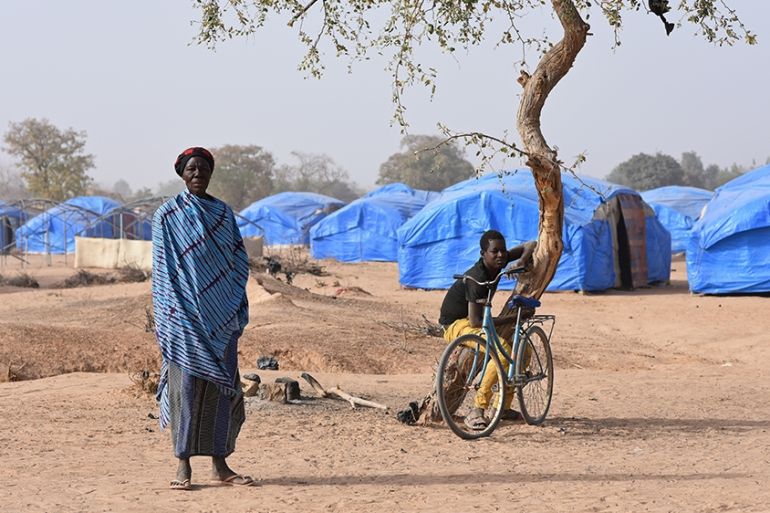In Burkina Faso, COVID-19 fight complicated by war, displacement
Experts raise alarm over spread of coronavirus in a country plagued by conflict that has compromised healthcare system.

Ouagadougou, Burkina Faso – Just like much of the rest of the world, the coronavirus pandemic is about to upend daily life in Burkina Faso.
Starting on Monday, all schools and universities in the West African country will remain shut for the rest of the month.
Keep reading
list of 2 itemsCoronavirus: Which countries have confirmed cases?
Authorities have also banned gatherings of more than 50 people, leading to large events such as concerts and football matches being postponed or cancelled.
In the capital, Ouagadougou, popular venues for socialising were noticeably quieter over the weekend while some residents said they would avoid travel between cities.
War, displacement, weak health system
Burkina Faso has so far registered seven cases of the highly infectious respiratory disease called COVID-19 but NGOs fear many cases could go undiagnosed in a country whose healthcare system has been gutted by conflict.
An impoverished country of some 20 million people, Burkina Faso has in recent years been gripped by escalating violence that has spread across the Sahel region to several countries including Niger and Mali.
Last year, clashes between government forces, bandits and armed groups linked to ISIL and al-Qaeda led to more than 2,000 deaths in Burkina Faso and forced more than 700,000 people to flee their homes.
“In Burkina Faso, the conflict has severely compromised the health infrastructure,” Laurent Saugy, head of the International Committee of the Red Cross (ICRC) delegation in the country, told Al Jazeera.
“Some 1.5 million people have seen their access to healthcare cut or significantly reduced since 2019, due to the escalation of violence.”
|
|
Concerns over COVID-19 rose on Thursday when it emerged that the first case registered in Ethiopia involved a Japanese national who travelled there from Burkina Faso on March 4.
At the time, Burkina Faso had logged two cases – a couple who had recently returned to Burkina Faso from a trip to France.
Amid worries over a possible major outbreak, NGOs warned that a mix of conflict, displacement and weak health infrastructure could lead to a devastating loss of life.
“In a best-case scenario, which is what we’re living in at the moment, we would have only a few cases,” Jerry-Jonas Mbasha, cluster coordinator for the World Health Organization (WHO) in Burkina Faso, told Al Jazeera.
“In a worst-case scenario, we could see fatality rates five to 10 times higher than the global average.”
The WHO has said that 3.4 percent of people with reported COVID-19 infections around the world have died.
Citing Burkina Faso’s “very weak” healthcare system, Mbasha said the country’s escalating conflict could “deepen” the problem.
“A lot of people have been displaced and health facilities have been closed due to insecurity and conflict. That’s another factor that could prevent the health systems from detecting early cases,” he added.
|
|
Response plan
Al Jazeera has learned that, as of Wednesday, there were only 400 coronavirus test kits available in Burkina Faso, with only three health facilities in the country able to carry out the tests – two in Ouagadougou and one in the second city of Bobo Dioulasso.
On Thursday, the government released its official COVID-19 response and prevention plan which stipulates nine key pillars, including the surveillance of entry points, the establishment of rapid intervention teams and an epidemiological surveillance system, among others.
The plan requires that a committee be set up to oversee each of the pillars but it is still not clear if these committees have been established, and sources have told Al Jazeera the government response has been slow.
A government spokesperson could not be reached for comment.
Saugy stressed that the conflict would be a major factor in how coronavirus plays out in the country and said the focus should be on enabling those displaced and their host communities to access critical information and healthcare in the event of an outbreak.
“A weakened health system due to conflict and violence impairs the capacity for detection, management and the follow-up of cases of sickness, which in turn may increase the risk of transmission.”
For his part, Mbasha called on the international community to step in to help avoid a major crisis.
“We need technical and financial partners to come in and protect Burkina Faso, as do other African countries which are facing the same situation.”
As of Sunday, there were 273 confirmed cases and six deaths in 26 countries across Africa.